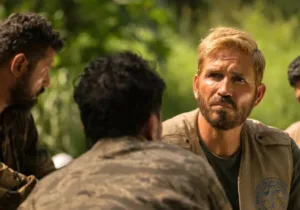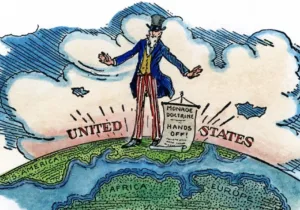“Close your eyes and listen,” he implored. “Listen to the silent screams of terrified mothers, the prayers of anguished old men and women. Listen to the tears of children, Jewish children, a beautiful little girl among them, with golden hair, whose vulnerable tenderness has never left me. Look and listen as they quietly walk towards dark flames so gigantic that the planet itself seemed in danger.” Elie Wiesel spoke these words on a cold day, though only mildly so, especially for the potential of a Polish winter day in January.
Around me were others who had congregated at Auschwitz-Birkenau to commemorate the 50th anniversary of the liberation of that terrible place. “Where else can we say to the world: “Remember the morality of the human condition,” if not here?” Wiesel wondered aloud. Indeed, the human condition, particularly its reformation, would be in his sights the whole of his long life – though it was hardly long enough. To listen to Wiesel, was to register his frustration at failing to move the bubble very much. Much in the world has changed since the crematoria fires went cold at Auschwitz, but the human condition has proved constant. Neighbor continues to prey upon neighbor as has been done time out of mind.
Some years back, as I’ve written in these pages before, the Oxford professor Nigel Biggar, in a Remembrance Sunday sermon at the Christ Church Cathedral in Dublin, recalled a visit to the Deutscher Soldatenfriedhof – the German military cemetery – at Maleme, in Crete. There, in 1941, British, Australian, New Zealand, and Greek troops fought against invading German paratroopers. An exhibition now tells the story of three brothers, two who, one still in his teens, “hero-worshipped the older one” and followed him into the elite paratrooper regiment. In Maleme, all three were killed on the same day. It is, Biggar remarked, “A heart-breaking story. A very tragic story.” But it is not the whole story. The exhibit, he continued, draws from this story the conclusion that “war is evil, war is the great plague, war it is that which we must resolve to avoid absolutely and everywhere.” Against this conclusion Biggar thought to himself, “Well, yes…but no.” Among other things, absent from the exhibit was any consideration of why it was that young German paratroopers were dropping out of the skies over Crete in the first place. That question, Biggar points out, raises the sharper question of precisely what it was that those on the ground were supposed to do in response if, in fact, war is that thing which we are to avoid absolutely.
My own exposure to the holocaust, first as a field of formal study, then as a theological crisis that eventuated in my own conversion, and then as a subject of my own vocation as a teacher and writer, has served to permanently inoculate me against pacifism. Regarding Auschwitz-Birkenau and the near uncountable other plots of land the Nazis drenched in blood, it is clear that neither harsh language, nor coaxing words, nor prayer, would, alone, have been enough to stop the slaughter. The fascist beasts, they themselves made plain, would only have left Auschwitz on their own accord when there was no one left to kill. But for all the ready supplies of Gypsies, Slavs, Leftists, Dis-abled, down-syndromes, non-Aryan POWs, Homosexuals, non-fascist resisters, and Jews – always and especially Jews — who would have come into the bloody reach of the Reich if the rest of the world had avoided war at all costs, this killing would have taken some time to abate. Even as it was, Auschwitz remains, surely, the single largest cemetery and crime scene in the world. When Wiesel finished his talk, and the formalities concluded, they began to recite over loud speaker the names of the known dead who were murdered in the camp around us. Imagining for the moment that they were able to read all the names of the estimated 1.1 million killed there, and imagining that the recitation proceeded at the pace of a single name per second, it would have taken nearly thirteen days of continuous reading to say aloud the names entire. Surely, as Biggar concluded, war is to be avoided at great costs, but not all costs.
“The opposite of love,” Wiesel proclaimed, “is not hate, but indifference.” Indifference, he insisted, “is the epitome of evil.” Against it, Wiesel stood resolute:
I swore never to be silent whenever and wherever human beings endure suffering and humiliation. We must always take sides. Neutrality helps the oppressor, never the victim. Silence encourages the tormentor, never the tormented.
There are many ways to be indifferent. While few people or ethical systems are truly indifferent in the face of abhorrent evil, many more are practically so. That is, they are unwilling – either as a matter of principle or simply insufficient grit – to take actions that can effect genuine resistance against a given evil. Just so, it is effectively indifference to claim, as some pacifists do, that the sword wielded for peace, order, and justice is the business of the government and not the business of Christians. Christians, such claimants insist, are called away from the use of force in order to provide a witness of an alternative, peaceable kingdom. As I’ve argued before, if the peaceable kingdom were a viable alternative to force, even of the lethal kind, then God would have ordained such a kingdom instead of, rather than alongside, the government’s sword. Given that God has ordained the sword, I stand among those who infer, therefore, that the sword is necessary. And if the sword is necessary, then that makes the peaceable kingdom parasitic – because it cannot long remain in a world in which the good do not bear arms. Pacifists present a false witness to the peaceable kingdom because they are wrong in the way they imagine the world ought to be. Any ethic, any system of belief, that does not countenance, in a world that conceived Auschwitz-Birkenau, that there are times, in the last resort, when love of neighbor means bringing force to bear against their assailants – even crushing, lethal force if nothing else will do the trick, does not fully understand love. Those who demand an accounting for the blood and death that comes with fighting even wars that are just, must themselves give an account for the blood and death that comes when just wars are not fought.
Elie Wiesel understood that to stand against injustice and to seek effective remedy, is as important for the would-be rescuer as it is for those they seek to rescue. “As long as one dissident is in prison, our freedom will not be true,” he wrote. He continued:
As long as one child is hungry, our lives will be filled with anguish and shame. What all these victims need above all is to know that they are not alone; that we are not forgetting them, that when their voices are stifled we shall lend them ours, that while their freedom depends on ours, the quality of our freedom depends on theirs.
But it is not just the fighting spirit that is to be remembered today. “I had anger,” Wiesel, I imagine gladly, confessed, “but I never had hate.” I myself have lived long enough, I suppose, to rightly doubt that suffering is necessarily ennobling. Rather it is like strong drink taken in excess – it brings to the surface those latent characteristics that have always been present and that blossom forth in times of stress. The qualities that were revealed in Wiesel were deeply admirable. “Every hour is a grace,” he believed, and gratitude was his response. This gratitude was expressed partly in a tireless devotion to the causes of the powerless and to the responsible use of American power to give aide to those in need of it.
Elie Wiesel, an ambassador to the human condition, passed from this world on the Sabbath day. It seems an appropriate time for one such as he to enter into that final rest. But for those of us who continue to tarry here a bit longer, we have before us a mandate: as long as we live, he too will live; he will be a part of us forever; we must always remember to never forget.
—
Marc LiVecche is managing editor of Providence
image credit: wikimedia commons







 Sponsor a student for Christianity & National Security 2024
Sponsor a student for Christianity & National Security 2024